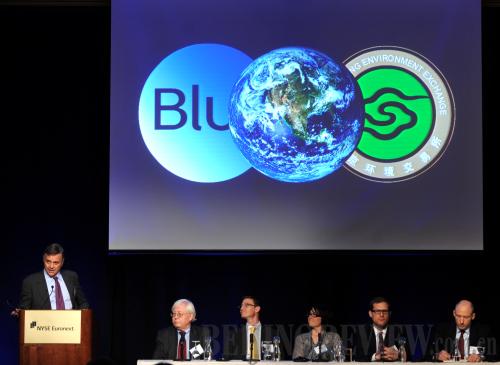|
 |
|
WIDER COOPERATION: The China-U.S. Carbon Finance Conference opens at the New York Stock Exchange on December 13, 2010. Nearly 150 experts from the two countries gathered for discussions on carbon finance and low-carbon technology (SHEN HONG) |
Maintaining peace and stability on the Korean Peninsula and the promotion of denuclearization on the peninsula will help Northeast Asia to realize long-term peace and safety; this is the biggest common interest of China and the United States on the Korean Peninsula nuclear issue. China sticks to the principles of "peace, stability and denuclearization" and urges North Korea and South Korea to remain calm and exercise self-restraint, so as to push forward peaceful negotiations. It believes the six-party talks involving the United States, North Korea, South Korea, China, Russia and Japan provide the best platform for denuclearization and stability on the Korean Peninsula and long-term peace and security in Northeast Asia.
Although the Taiwan issue concerns China's core interest, the United States is unlikely to stop selling weapons to Taiwan in the near future. During George H.W. Bush's presidency (1989-1993), Washington sold weapons including submarines and F-16 fighters to Taiwan. Last year, military exchanges between the two countries were suspended due to such sales.
Military exchanges resumed with Gates' visit, but U.S. weapon sales to Taiwan will not end with the visit, as they allow the United States to demonstrate its strength. Restored Sino-U.S. military ties, however, will have positive implications for the Asia-Pacific region in general.
China and the United States now realize that a tense and contested bilateral relationship will hurt both and will do nothing to solve international or regional issues. It is unrealistic to hope to solve Asian issues without China's active involvement. Therefore, the two presidents will underline the importance of Sino-U.S. coordination. Both sides will lay their cards on the table, spelling out differences and points of agreement.
A historic visit
Currently, one of China's most pressing tasks is to create a favorable international environment for its development. The United States has been the top world power and will remain the strongest country for a long time. But it is also a fact that China has become a leading player in Asia. The coexistence of cooperation and competition will be a normal state of the Sino-U.S. relationship. However, remaining rational and exercising self-restraint are imperative for both sides.
President Hu's U.S. trip comes at a difficult time, as the Sino-U.S. relationship has cooled, the Asian security situation is deteriorating and the global economic recovery is faltering. As the world's two largest economies, China and the United States should conduct dialogue and seek common understanding, eliminate misunderstanding, increase common interests and avoid confrontation. They have good reason to shelve differences and focus on long-term strategic interests.
Hu's visit will present a good opportunity for the two countries to cement bilateral ties and achieve win-win results. During the visit, China and the United States are expected to sign a series of cooperative documents in areas such as trade, energy, environment, infrastructure, culture and technology.
History has proved that visits by top leaders during crucial times can greatly promote bilateral relationship. Hu's visit is expected to give a boost to the development of Sino-U.S.
cooperation and enhance friendship and mutual understanding among Chinese and American people. It will also demonstrate a shared will to maintain world peace, stability and development.
Both countries have realized they have more common understanding than differences, and cooperation remains the core of bilateral relations. They must deal with differences and conflicts properly and make more effort on risk control and crisis management, so as to ensure the Sino-U.S. relationship is on the right track. Growing common interests have enabled the two countries to work together. They will also lay the groundwork for a robust Sino-U.S. relationship in the 21st century.
The author is a research fellow with the China Institute of International Studies | 